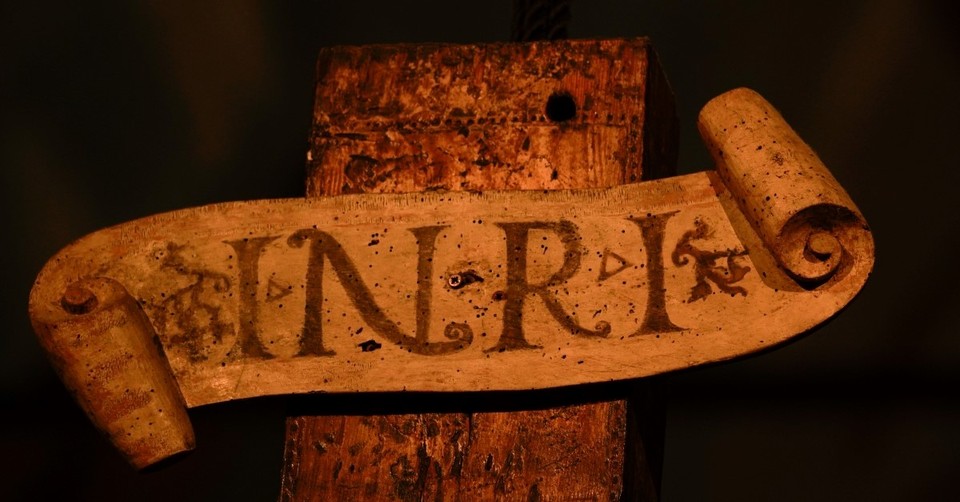What Is the Meaning of INRI on Jesus' Cross?

What does INRI mean, and how does it apply to modern Christians? The meaning and application are both tied to a plan God formed in eternity to redeem His people through a messiah who would save His people. The Pharisees and Sadducees sought an earthly king who would lead them to victory over their enemies. Jesus didn’t look anything like what they were expecting, so they dismissed him as a blasphemer and had him crucified. They didn’t realize that God had far greater plans than just an earthly kingdom that would conquer worldly enemies. Instead, He sent His Only Son to defeat sin and death and open an eternal kingdom to all who would come.
What Does the Acronym INRI Mean?
INRI is an acronym for the Latin phrase Iesus Nazarenus Rex Iudaeorum, which is translated as “Jesus the Nazarene, King of the Jews.” Pilate ordered for this to be put on a sign and placed over his head during his crucifixion. In Roman times, anyone executed had a sign giving the crime for which they were punished. It was meant to give public notice and add greater shame to those executed. While the sign “King of the Jews” and the crown of thorns were meant to mock Jesus, God used them instead to proclaim Jesus as King.
Why Is the Message INRI Written in Latin?
During Jesus’ time, the Jews spoke Hebrew and Aramaic, but the common language of the region was Koine Greek since the conquest of Alexander the Great.
After Alexander died, Rome conquered Greece and the Roman Empire spread until it held all of the Mediterranean. The language of Rome and its leaders was Latin. Pontius Pilate was a Roman prefect (or governor), so the accusation against Jesus was written in Latin, Greek, and Hebrew so all could read it (John 19:20).
Why Did the Religious Leaders Object to Pilate Writing INRI on the Cross?
According to Jesus is the King of the Jews, the title King of the Jews had political and prophetic implications. In the Old Testament, God wanted to rule over Israel, but they begged for a human king:
“Then all the elders of Israel gathered together and came to Samuel at Ramah, and said to him, ‘Look, you are old, and your sons do not walk in your ways. Now make us a king to judge us like all the nations.’” (1 Samuel 8:4-5).
God gave them what they wanted, but He also proclaimed the coming of the Messiah who would rule forever:
“For unto us a Child is born, Unto us a Son is given; And the government will be upon His shoulder. And His name will be called Wonderful, Counselor, Mighty God, Everlasting Father, Prince of Peace. Of the increase of His government and peace there will be no end, Upon the throne of David and over His kingdom, To order it and establish it with judgment and justice From that time forward, even forever. The zeal of the Lord of hosts will perform this.” (Isaiah 9:6-7)
Greg Laurie summarizes Pontius Pilate in this way:
(The following is a transcript of the video above, edited for clarity).
“Pilate was a powerful man. He was also a hard man. A man who did not like to be trifled with. He was also a man in hot water because you see, he had had a number of run-ins, according to history, with the religious Jewish leaders at this point. And he didn’t need another conflict. And it was clear to him that they wanted the execution of Jesus. And though he effectively gave them permission to do it themselves, go and take care of him according to your law, which was Pilate’s way of saying, ‘If you guys want to go stone him, I could care less. Just take this away from me.’ But they said, ‘No, no, you need to deal with this.’ Because they wanted not just a death but a Roman death. They wanted crucifixion. Pilate was looking for a way out of this. He tried to offer Barabbas in the place of Jesus, and he was hoping if he would give them a choice of who to release because of his Passover, that people would pick Jesus over Barabbas, a horrible criminal.
But instead, the people cry for Jesus. So, in one last ditch effort to appease the bloodthirsty crowds, Pilate has Jesus scoured. And as you know, that was not just a common whip, but it was the Roman cat-of-nine tails. Usually, a base made out of wood, multiple strands of leather embedded with pieces of metal and glass. And every time the lash of this whip would come on the back of the prisoner, it would rip into the skin, taking off the skin, opening up the blood vessels, even exposing vital organs. Many men did not survive. Discouraging. Jesus takes the full 39 lashes, and then Pilate parades him out before the crowd, looking for mercy. ‘Behold the man,’ he says, till they cry, ‘Crucify him.’ So he gives the command for Jesus to be taken away.”
Pilate was in even more hot water than what Laurie describes. Not only had he clashed with the religious leaders in the past, but he had an embarrassing political past: he had received his position from Sejanus, a Roman who had killed Emperor Tiberius’ son and conspired to kill the emperor himself. (for more on that, read Hope Bolinger’s article on Pilate).
Pilate couldn’t find any crime to accuse Jesus of, but he sent Jesus to be crucified anyway to placate the crowds and religious leaders.
However, he had the sign hung above the cross. The religious leaders were angry because they said it should read that Jesus said he was King of the Jews, but Pilate wouldn’t change it. The religious leaders wanted it to say Jesus was a blasphemer, but Pilate wrote it in a way that made it seem like a title (John 19:21).
What Does INRI’s Meaning Teach Us about Jesus?
So, what does INRI have to do with the modern Christian who is a gentile? How does King of the Jews apply to us? God’s plan for all humanity began in eternity. If you look at the whole Bible, you can see that the Old Testament (covenant) foreshadows the New Testament (covenant) that brought salvation to the whole world. So, let’s take a closer look at the covenants, starting with the Old Testament and God’s covenant with Abraham.
In her article on the Abrahamic Covenant, Debbie Wilson explains the nature of a covenant, specifically the one between Abraham and God:
“And I will establish My covenant between Me and you and your descendants after you in their generations, for an everlasting covenant, to be God to you and your descendants after you” (Genesis 17:7).
Notice the phrase “everlasting covenant”? It foreshadowed the New Covenant (or Testament) that Jesus would establish. He would refer to this covenant at the Last Supper:
“Then He took the cup, and when He had given thanks He gave it to them, and they all drank from it. And He said to them, ‘This is My blood of the new covenant, which is shed for many’” (Mark 14:23-24).
The purpose of the (old and new) covenants was to establish a relationship between God and man by creating a way to redeem man from sin. Paul explains in Romans 4 the connection between God’s covenant with Abraham and us:
“For the promise that he would be the heir of the world was not to Abraham or to his seed through the law, but through the righteousness of faith . . . Therefore it is of faith that it might be according to grace, so that the promise might be sure to all the seed, not only to those who are of the law, but also to those who are of the faith of Abraham, who is the father of us all.” (Romans 4:13, 16)
The promise and the covenant are available to all because we are saved through faith, not works.
The role of Jesus also extends beyond that of the Messiah or savior. INRI is the title for the King of the Jews, which means Jesus was given the title of King as well as of the Messiah. In the Old Testament, the Israelites were ruled by prophets, priests, and kings. Different people carried out each role. Revelation tells us that Jesus is all three in one: “. . . from Jesus Christ, the faithful witness, the firstborn from the dead, and the ruler over the kings of the earth. To Him who loved us and washed us from our sins in His own blood” (Revelation 1:5). He isn’t just King of the Jews; He is ruler over all the kings of the earth. This makes Him our king, too. Jesus is prophet, priest, and king to all who follow Him. (For further reading about the three roles of Jesus, check out this article by Danielle Bernock.)
From the beginning of time, God put into motion a plan that would bring salvation to all the earth. INRI was one part of a much bigger plan than anyone at the time could comprehend. The Messiah has come and opened the way of redemption and salvation for whosoever will come. He is King of Kings and Lord of Lords for all eternity.
Photo Credit: ©GettyImages/Jako van Gorsel
Linda Lyle is a writer, teacher, knitter, and unintentional collector of cats. She has written articles for the Alabama Baptist, Open Windows, Refresh, as well as multiple novels and novellas. Her newest book, 5-Minute Prayer Plan for When Life Is Overwhelming, is set to release in October. She spins yarns on her blog The End of My Yarn at lindalyle.com.
Learn more about the meaning and significance behind the Easter holiday and Holy Week celebrations:
What is Lent? and When Does Lent Start?
What is Ash Wednesday? and When is Ash Wednesday?
What is Palm Sunday?
What is Maundy Thursday?
What is Good Friday? and When is Good Friday?
What is Holy Saturday?
What is Easter? and When is Easter Sunday?
Easter Bible Verses
The Resurrection of Jesus
Easter Prayers

Originally published February 27, 2024.





